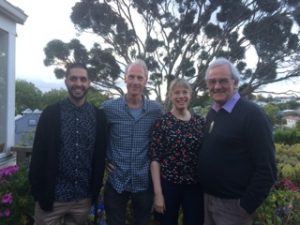By David Williams –
An interdisciplinary team of University of Auckland staff from Social Anthropology and Law are nearing the completion of their work on a Marsden Fund project. We are preparing a book manuscript entitled The Shapeshifting Crown: Locating the State in Post-Colonial New Zealand and the Queen’s Other Realms. The team is led by Professor Cris Shore, who has recently been honoured by the Royal Society of New Zealand with the Mason Durie Medal for his contributions to political anthropology and the study of organisations, governance and power. I have been the Associate Investigator bringing to the project a strong interest in the ambiguities and uncertainties associated with the role of the Crown in legal history and in contemporary constitutional law. We have supervised and worked with two excellent social anthropology MA graduates – Sally Raudon and Jai Patel.
The team has conducted numerous ethnographic research interviews in the four realms of New Zealand, Australia, Canada and the United Kingdom. Among the questions we have put to interviewees and to ourselves are the paradox that, while the Crown is highly visible in each of these Commonwealth nations, and features prominently in everyday political discourse, it is shrouded in uncertainty and poorly understood. It is remarkable that this ancient, enduring, omnipresent ‘something’ that straddles the entire structure of government remains so elusive and problematic. Is the Crown the Queen? The Governor-General, the State, a corporation sole or aggregate, a residual English feudal category, a metaphor, or a mask for executive power? Even constitutional experts struggle to define its attributes and boundaries: who or what is the Crown and how is it embodied? What survives of its reserve powers and immunities? How are its prerogatives defined and exercised? And how have the Crowns of Commonwealth countries – tracing back to the same sovereign – developed in diverging ways? Are they in broad terms conceptually equivalent? What characteristics do they share, and what are their local peculiarities and distinctive features?
Over the three years of our project the ground has shifted in terms of public debates about the future of the Crown. At the outset, the mantra of most people who were interested in the matter, even in Australia, was that there was little appetite for renewed debate on republican constitutional reform until after the present Queen has died. In the last year political leaders in New Zealand and Australia have reignited that debate. A book by Sir Geoffrey Palmer and Dr Andrew Butler has included a draft constitution that will eliminate the Crown from all state institutions. Yet even those who argue for constitutional reform seem unwilling to grapple with what might be entailed by an abrupt elimination of the powerful symbolic meanings associated with the Crown. What symbols would a newly republican state mint? What might have been learned from the failure of the New Zealand referenda on a new national flag? In New Zealand there are conflicting assessments of the future status of the Treaty of Waitangi and of the Waitangi Tribunal’s findings that as a matter of history Māori did not cede their sovereignty when adhering to the Treaty.
We will discuss some of the issues that our research has brought up at a two-day symposium at the University of Auckland on 2-3 November. It is entitled:
The Crown and Constitutional Reform: Perspectives on a political enigma and symbol of statehood
This will be an interdisciplinary exchange on the legal, political and social dimensions of the Crown, its place in the constitutional order, its shifting symbolic forms and meanings and the changing nature of the state and government in post-colonial settler societies. The symposium is open to the public. It will be addressed by a number of distinguished guests from other realms: Phillippe Lagassé from Carleton University, Canada; Sebastian Payne from Kent in the UK; and Sean Brennan and Anne Twomey from Australia. Local speakers include Sir Anand Satyanand, Morgan Godfery, Janet McLean and Margaret Kawharu.
David Williams is a professor of Law at the University of Auckland


